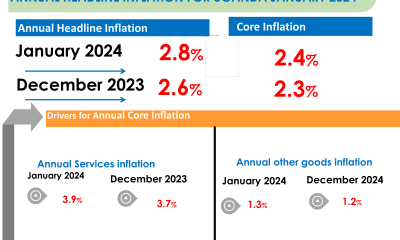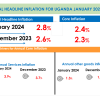In a recent report, the Africa Trade Barometer has shed light on a critical issue that is hindering Uganda’s ability to compete in the global market.
The report emphasizes that the cost of transport and logistics in Uganda is significantly higher compared to many other countries, making it challenging for Ugandan businesses to produce competitive products. Transport and logistics expenses comprise a substantial portion of production costs in Uganda, ranging from 35 percent to 42 percent, as highlighted by a report from Standard Bank (trading as Stanbic in Uganda).
The Africa Trade Barometer, which evaluates trade performance in ten African countries, including Uganda, has highlighted the alarming disparity in transport and logistics costs. It reveals that while Uganda grapples with these high costs, many Asian countries maintain a meager 8 percent contribution from transport and logistics to their production expenses.
The impact of poor infrastructure on Ugandan exports.
The report underscores the detrimental effects of poor infrastructure on the competitiveness of Ugandan exports. Additionally, this situation significantly inflates the costs associated with importing goods into the country. To rectify this situation, the report suggests that an improvement in Uganda’s transport and logistics infrastructure is imperative. Such improvements would enable Ugandan businesses to compete more effectively with their counterparts in other countries and capitalize on the benefits of increased intra-African trade.
Challenges with Uganda’s road network.
One of the major components contributing to high transport costs is the state of Uganda’s road network. According to data from the Uganda National Roads Authority, the country has a national road network spanning 21,000 kilometers, of which only about 8,588 kilometers are paved or tarmacked. The lack of a well-developed road network, coupled with limited alternative means of transportation such as waterways and railways, compounds the issue of costly transport.
Increasing awareness of the African Continental Free Trade Agreement (AfCFTA)
Despite these challenges, there is a glimmer of hope. The report also reveals that awareness of the African Continental Free Trade Agreement (AfCFTA) among Ugandan businesses has significantly increased to 33 percent. This indicates that the business community in Uganda is increasingly showing interest in the continent’s trade area.
Uganda, one of the 54 signatories to AfCFTA, is committed to eliminating tariffs on most goods and services traded within Africa, aiming to create a single market for goods and services while reducing trade barriers. The agreement entered its operational phase in July 2019, and participating countries are gradually working toward its objectives.
The Africa trade barometer’s Role in fostering Intra-African trade.
The Africa Trade Barometer, launched in 2022, plays a crucial role in addressing the information gap regarding African trade data. By offering valuable insights and statistics, it supports and encourages the growth of intra-African trade. The report’s findings indicate that there is a growing appetite for regional trade integration, which is a positive sign for Uganda’s business community.
In conclusion, the high transport costs in Uganda pose a significant challenge to the country’s competitiveness in the global market. Addressing these issues will require investments in infrastructure and the development of alternative means of transportation. Meanwhile, the increasing awareness of AfCFTA is a promising development, offering hope for Uganda’s businesses to thrive in the evolving landscape of African trade.
















